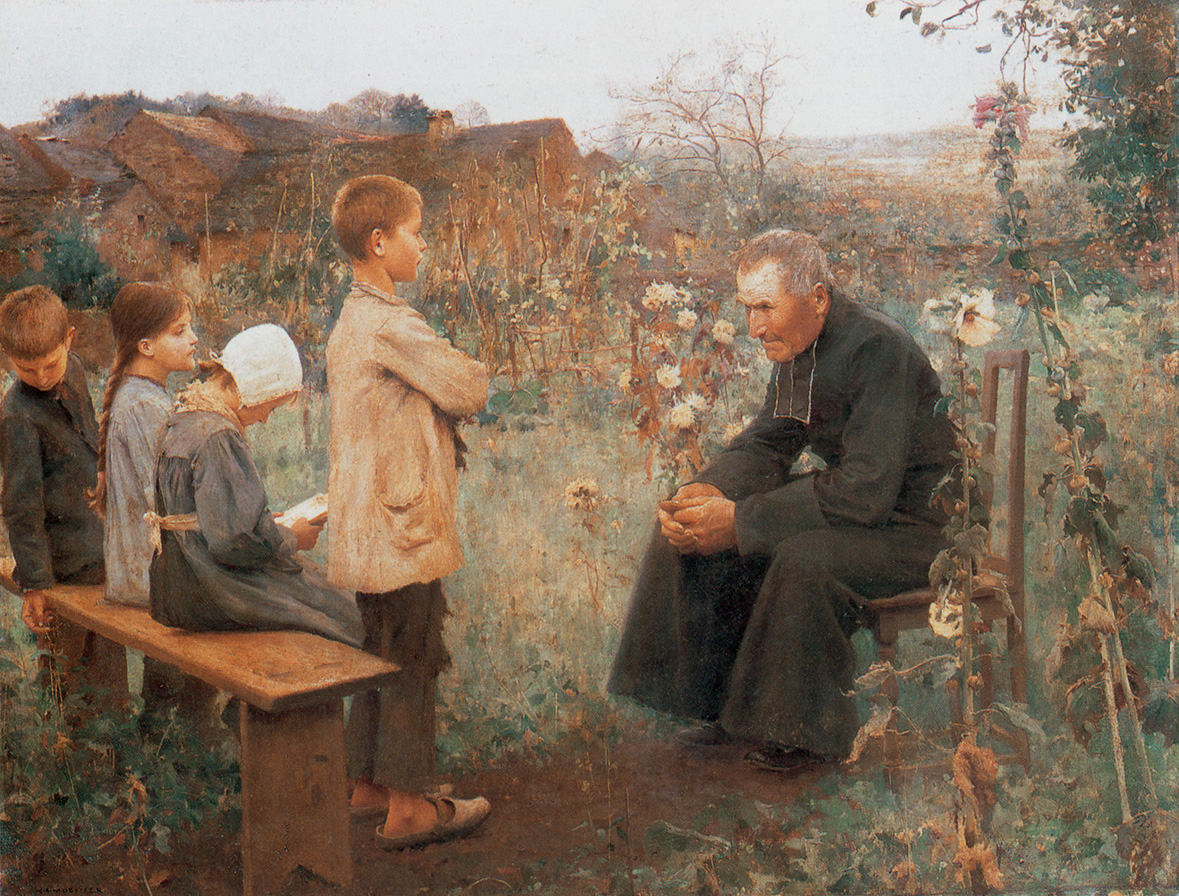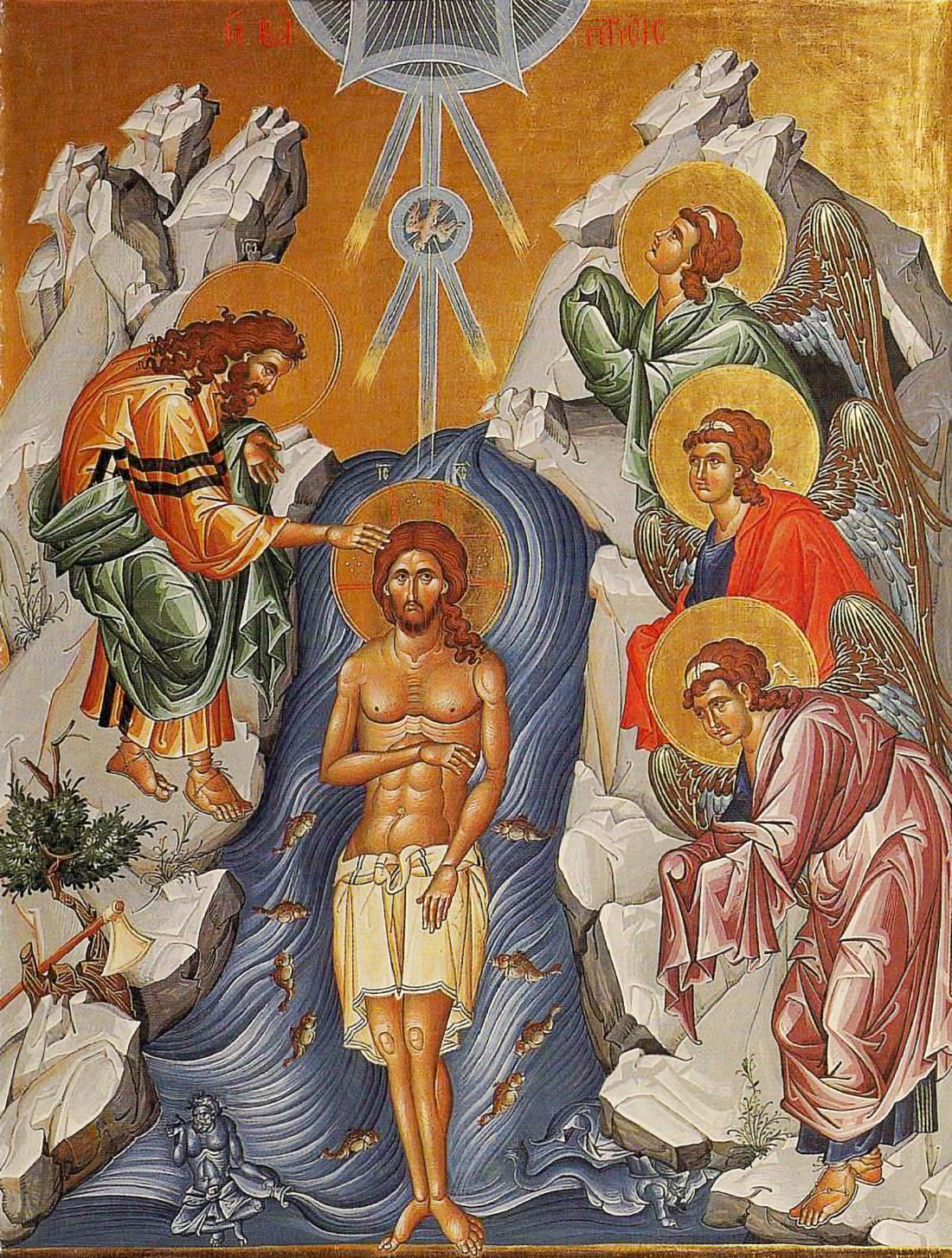First Sunday of Lent: Genesis 9:8-15, 1 Peter 3:18-22, Mark 1:12-15.
While on our personal Lenten journeys with Christ, we sometimes forget that it is also the season for the elect to formally pledge themselves to the Church, finish their preparation, and present themselves for Baptism, Confirmation, and First Holy Communion at Easter Vigil Mass. This form of the Rite of Christian Initiation for Adults is a modern way we grow the Body of Christ and has a rich tradition stretching back to the very first days of the Apostolic Age. During Roman persecutions, Catechumenate faced execution for attempting to join the Church, and this act of faith was a truly courageous act. In the third and fourth centuries, adult initiates had a long, three-year process of formation (at least) that impressed the seriousness of their conversion and salvation. Over the centuries, this catechism devolved into “mass baptisms” of many people and the seriousness of their training and conversion was rightfully questioned. In any case, today we have a formalized process that is by no means as rigorous as the early centuries but does impress both the seriousness of the sacramental union with the Church and an understanding of our teachings (our Catechism of the Catholic Church). Lent is the season of the Catechumenates’ final preparations to join and grow the Church.

The three-year cycle of Sunday readings reflects this aspect of Lent, doing the work of reminding all of us of the major tenants of our history and faith, not to mention the importance of our sacraments. This transitions, of course, during Holy Week to recount the Passion, Death and Resurrection of our Savior, but it might be surprising to learn that the Church has ordered her readings on Sundays in Lent to help serve the formation of our Catechumenate. (For those who are interested, the daily readings for Lent and Advent are the same from year to year unlike their two-year cycle in Ordinary Time).
So we can approach today’s readings with this framework in mind. Appropriately enough, we encounter the theme of baptism, particularly as spiritual protection. The first reading from Genesis recounts the upshot of Noah’s faithful obedience to God in building the ark. God tells him, “See, I am now establishing my covenant with you and your descendants after you and with every living creature that was with you: … there shall not be another flood to devastate the earth.” The Church sees great symbolism in the flood story. It is God’s second great covenant with humanity (the first being with Adam and Eve); the ark — the saving vessel in the face of God’s purifying force — prefigures the Church that will arise through Christ; the flood is a type of baptism, in this case a baptism that wipes away the evil of the world and blesses and ties Noah to God in a new covenant. The great tropes of baptism have been established: spiritual purification and a binding covenant with God through water.
The first letter of St. Peter makes the connection to the flood in Noah’s time and clearly states its significance: “… a few persons, eight in all, were saved through water. This prefigured baptism, which saves you now. It is not a removal of dirt from the body but an appeal to God for a clear conscience …” This last statement is a bit confusing; is baptism an appeal to God for a clear conscience? I suppose it is, although the NRSV translation’s footnote says “Or a pledge to God from” a clear conscience. Interesting that our pledge could be perceived either as “for” or “from” a clear conscience. As this point, I often consult another translation, and I think the David Bentley Hart’s New Testament translation serves admirably (along with his three very long explanatory footnotes for this section): “… a few — that is, eight souls — were brought safe through the water. Which also prefigures the baptism that now saves you — which is not a removal of the filth of flesh but rather the pledged consent of a good conscience to God — through resurrection of Jesus the Anointed.” He has a nice footnote to justify his translation of “pledged consent” and it does seem to wrap up the “to” vs. “from” debate by implying that God requests our good conscience in entering into the baptismal covenant and we give it to Him. This reinforces the fact of our own free will and choice in baptism — something much more apparent in adult baptism than in infant baptism and thus very appropriate for this RCIA formation period.

This whole discussion of conscience was initiated in the verses just prior to today’s reading. Peter encourages us to not be intimidated by those who seek to destroy our belief: “Keep your conscience clear, so that, when you are maligned, those who abuse you for your good conduct in Christ may be put to shame. For it is better to suffer for doing good, if suffering should be God’s will, than to suffer for doing evil. For Christ also suffered for sins once for all, the righteous for the unrighteous, in order to bring you to God” (1 Pet 3:16-18). A good conscience, which is part of the baptismal covenant, is important because Christians should be “living in the light.” Moreover, Peter points out that Christ, who is ultimately righteous and bears a clean conscience, suffered for all of us unrighteous souls, so He set the example of the Way we must walk.
All of this baptismal rubber hits the road when we encounter the gospel reading. St. Mark’s gospel, commonly seen as the earliest gospel, upon which Matthew and Luke drew, is very brief regarding the start of Christ’s ministry. There is great profundity; we must simply read it a bit slower and ponder each word. The setup to today’s reading is the Baptism of our Lord by St. John the Baptist. Mark writes: “And just as he was coming up out of the water, he saw the heavens torn apart and the Spirit descending like a dove on him. And a voice came from heaven, ‘You are my Son, the Beloved; with you I am well pleased'” (Mk 1:10-11). So early in the first chapter of the first gospel we see the Holy Trinity in its unity as well as its diverse Persons! Consider how deep this revelation of Christ as the Son of God is: we see the outpouring of love from the Father, the participation of the Spirit, active in the earth, and Son’s willing acceptance of the covenant with His Father, which He will crown with His Blood. Christ’s Baptism reveals for all to see the endlessly flowing love of the Trinity that has burst upon the earth with His presence. This is something wholly new, and when we are baptized in Christ, it is this supernatural love and glory that is bestowed upon us as well. What a gift to be adopted sons and daughters of the Father thanks to our great human brother and teacher, Jesus Christ.
As if sharing in the supernatural love of the Trinity was not enough, Mark shows us today how transformative a Christian baptism can be for us. He writes: “And the Spirit immediately drove him out into the wilderness. He was in the wilderness forty days, tempted by Satan; and he was with the wild beasts; and the angels waited on him” (NRSV translation). The dove-like Holy Spirit fills Jesus and immediately drives Him into the desert. Matthew and Luke write that the Spirit “leads him” but Mark is undeniably writing something more forceful. The Greek word he writes is ἐκβάλλει (ekballei), the very same word used throughout the gospels when Christ “casts out” demons. Mark seems to be saying that baptismal sanctification by the Holy Spirit causes something more extreme in us than a gentle “leading into the light.” It casts the domination of worldly concerns out of our soul. This is what happens when Christ is cast into the desert, with wild beasts instead of human concerns. The supernatural force of His Baptism is so great that He cannot stay with humans who are so ordered by their passions and designs; these are not the Way to the Father.
And while we can find profound meaning in the specific temptations that Satan imposes upon Jesus (see last year’s reflection, Getting to Know the Tempter, for thoughts on Matthew’s account of Jesus in the desert), Mark’s point is different. He notes that Jesus is tempted by the devil, but the emphasis is on the action of the Holy Spirit in Christ’s Baptism. The Spirit, let’s remember, has descended upon the Anointed One of God. While the Divine Persons undoubtedly can never be separated, we reflected last week on how Jesus put aside His divinity while taking on human form. He never stopped, on the order of Being, to be the Son of God, but His time on earth in mortal form included a complete assent to being human. With His Baptism, Jesus the man is fully revealed also as a Person of the Holy Trinity, and the Spirit can dwell with Him in a new way within that mortal lifetime.

So He is impelled by His Baptism and the indwelling of the Spirit to eschew the human ordering of self that occurs within civilization and go to the desert. This is something we are given in our baptism as well: a radical new orientation of ourselves within salvation history where we fully enter the End Times with Christ. This doesn’t mean we are outside of the fallen world, which is ruled by Satan. Thus, Christ is tempted by Satan, just as we shall be even after our baptism. But Mark shrugs aside these temptations as if inconsequential, for this is the Son of God, blessed by the Father and graced by the Spirit! This is why the more important point for Mark is that “the angels ministered to him.” Christ has opened a new way of living that bests the temptations of Satan and dwells in the company of angels. This is the promise of our New Covenant that we enter into in Christian baptism.
Mark’s final verses in today’s gospel reading affirm this new state of the world. The time of John the Baptist has passed with the Baptism of our Lord. Jesus announces: “This is the time of fulfillment. The kingdom of God is at hand. Repent, and believe in the gospel.” Note that He fulfills and concludes the very words of the Baptist, “Repent, for the kingdom of heaven has come near” (Mt 3:2). The kingdom is no longer near, it is “at hand.” The command to repent remains, for none are on the new path of Christ yet, and repentance and baptism await us all as a prerequisite to entering the Kingdom of God.
I don’t know about you, but there is something of the fire-and-brimstone Southern preacher in the call to “repent” that may deaden our ears to this call. It’s refreshing to look at Christ’s words in a new light outside of some of our cultural stereotypes. Here again is Bentley Hart’s translation: “change your hearts and have faith in the good tidings.” Yes, this is repentance: a change of heart. It is what baptism entails as part of our covenant with God — our promise to convert our hearts to Him. We remind ourselves of our baptism and conversion of heart every time we enter our church and bless ourselves with holy water. While on the earth, we will endlessly turn our hearts back to God, return to the Way any time we stray, and employ the sacraments to strengthen us, absolve our sins, and draw us closer and closer to our Lord.
May we all walk the way of the Catechumenate this Lent, repenting and re-affirming our covenant with God.